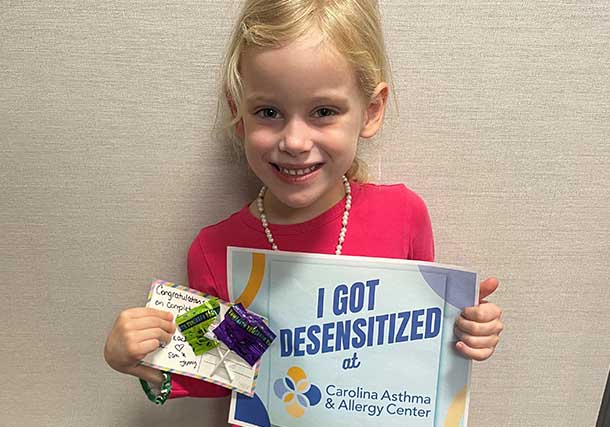
Food Allergy Testing in Charlotte
At Carolina Asthma & Allergy Center, we offer various types of food allergy testing around Charlotte to determine what’s causing your allergic reactions. Our team of Board-Certified allergists is here to give you the best care possible, and help you return to a sense of normalcy. Whether you’re having significant reactions or frustrating sensitivities, we’re here to help. We will guide you through the testing process, explain the results, and work with you to develop a personalized management plan that is both effective and convenient.
How to Request a Food Allergy Test Appointment
At Carolina Asthma and Allergy Center, we provide comprehensive evaluation and treatment for allergies, including food allergy testing. If you suspect you may have a food allergy or have experienced symptoms after exposure to certain foods, our team of board-certified allergists and experienced healthcare professionals can help.
To schedule an appointment, you can call our office or fill out the online appointment request form on our website. Our friendly staff will work with you to find a convenient date and time for your visit.
During your appointment, our allergists will carefully review your medical history, perform a thorough physical examination, and conduct relevant tests to determine the presence of an allergy. These tests may include a skin test, blood test, or food allergy challenge.
Based on the evaluation results, our team will develop a personalized treatment plan to effectively manage your food allergy symptoms and prevent future allergic reactions. Our goal is to provide you with the highest quality care and support in addressing your allergies, helping you lead a healthier and more comfortable life.
What is Food Allergy Testing?
Food allergy testing is exactly what it sounds like – a test that is administered to gauge an individual’s allergic reaction to certain foods. There are multiple different types of tests that an allergist may recommend including a skin test, a blood test or a food challenge.

How Does Food Allergy Testing Work?
Food allergy testing is a process that helps identify the specific triggers causing your allergic reactions. Simply put, allergies occur when the immune system overreacts to certain substances, like peanuts or shellfish. To determine the most effective treatment approach, our team will work closely with you to pinpoint the exact cause of your allergic reactions. This involves administering a series of tests.
During food allergy testing, small amounts of suspected allergens are applied to your skin. Under the supervision of doctors, your skin’s reaction to these allergens is carefully observed. Through this process, our doctors can determine which foods are responsible for triggering your allergic reactions. With this information, we collaborate with you to create a personalized management plan that will allow you to preserve your lifestyle.
How Do You Know if You Need a Food Allergy Test?
If you experience recurring or persistent symptoms that could be caused by certain foods, it may be beneficial to undergo a food allergy test.
People of all ages can benefit from food allergy testing. Here are some reasons that you may choose to schedule a food allergy test:
- History of Food Allergies: If you have a known history of food allergies, either personal or in your family, and you suspect that you are being exposed to allergens, a food allergy test can provide confirmation and help determine the best course of action for managing your allergies.
- Unexplained Reactions: If you have experienced unexplained reactions, such as difficulty breathing, swelling, or hives, after exposure to certain foods, a food allergy test can help identify the culprit and guide preventive measures.
- Checking On Your Children: Food allergy testing for kids is especially important to learn if your child has food allergies that could be severe or life-threatening.
- Lack of Reactions: After some time has passed, a lack of reaction to certain foods may also prompt you to take a food allergy test. Many adults schedule follow-up food allergy tests to see if they’ve outgrown their allergies.
If you are unsure whether you need an allergy test, it is recommended that you consult with a healthcare professional, such as a board-certified allergist or an immunologist. By identifying your specific allergens, you can develop a personalized management plan to reduce your exposure to certain ingredients and effectively manage your food allergies.
What are the Different Types of Food Allergy Testing?
At Carolina Asthma and Allergy Center, we offer three primary types of food allergy tests to help identify the specific foods that trigger your allergic reactions. Our experienced team of healthcare professionals and board-certified allergists will administer each of these tests in a controlled setting with a high level of supervision to ensure the patient has access to emergency help if needed. Here are some of the common types of food allergy tests we may use:
- Skin Test:In this test, the skin is lightly pricked with a solution of the food to introduce the allergen to the person’s system. An allergist can test one or multiple foods during this test. This process allows the allergist to see the body’s immunoglobulin E (IgE) reaction to certain food triggers. Results should appear within 10 minutes and will be analyzed by the allergist to determine a food allergy.
- Blood Test:After a blood sample is extracted from the patient, it is sent to a lab where the IgE antibody levels are tested. The results are typically ready within a week, and an allergist can determine if they indicate whether an allergen is present.
- Food Challenge: If a skin or blood test is inconclusive or presents a false positive, a patient can visit a registered dietitian to address food allergies. A food challenge slowly introduces the patient to a specific food to test their food intolerance. If they present mild or severe symptoms, the test stops, and the allergist starts to develop a treatment plan for the patient.
Each type of food allergy test has its advantages and disadvantages, and the choice of testing method will depend on your individual circumstances. The selection of the appropriate allergy test will depend on your medical history, symptoms, and suspected allergens. Our team will guide you through the testing process and ensure that you receive accurate and reliable results. Based on the test outcomes, we will develop a personalized treatment plan to manage your allergies effectively and improve your quality of life.
Summary
At Carolina Asthma & Allergy Center, we’re here to help you gain valuable insights into your food allergies and take proactive steps towards managing them effectively. Contact one of our Charlotte area locations today to schedule your food allergy testing appointment and embark on your journey to better health.
Food Allergy Testing FAQs
What can I expect before and after food allergy testing?
When scheduling your food allergy test, ask your allergist if there is anything you should do to prepare for the test. On most occasions, they will ask that you do not take any antihistamines (allergy medications) around three to five days prior to your appointment.
Since it’s difficult to diagnose food allergies, and an initial skin or blood test may present incorrect results, secondary tests may be recommended.

Try our new Allergy-Friendly Restaurant Guide
A curated list of Charlotte area restaurants with allergy-friendly menus, making it easier for individuals with food allergies to enjoy dining experiences without worry




